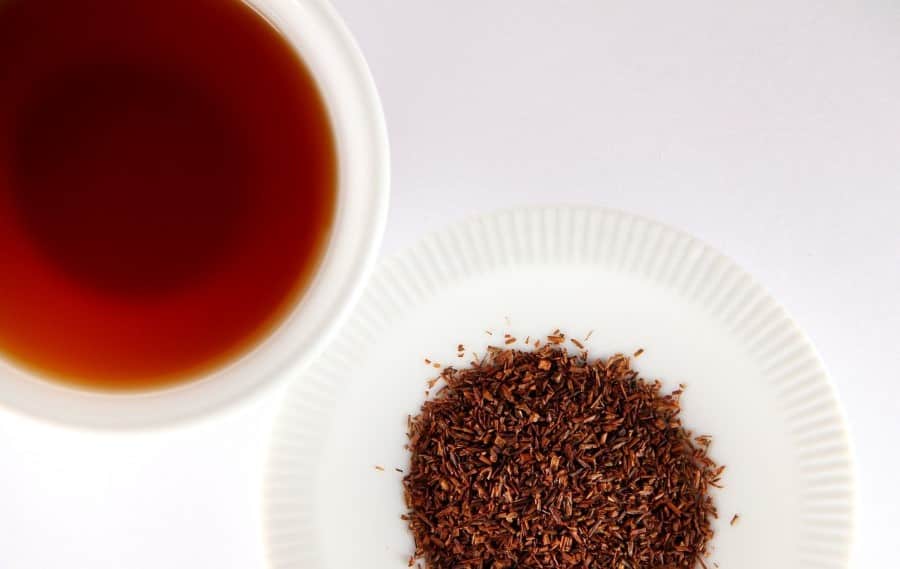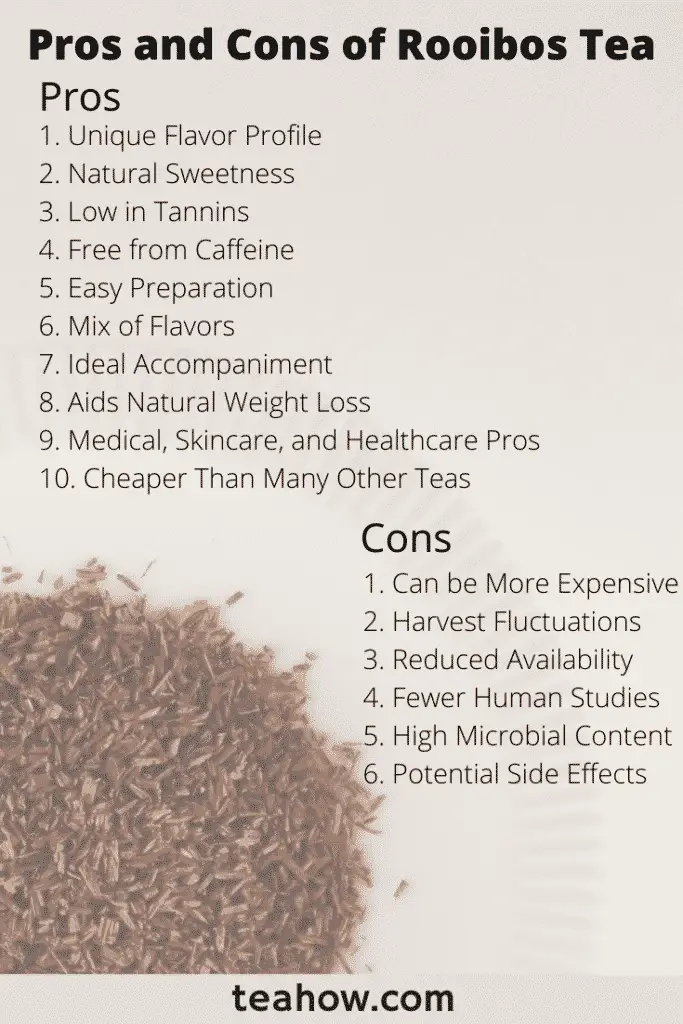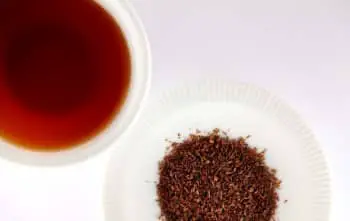Thinking of trying Rooibos tea? or should we say red bush tea? Well, as a seasoned tea connoisseur and owner of a site dedicated to tea, here’s my straightforward list of the pros and cons of Rooibos tea.
Let’s start with the pros and move on to the cons…
Pros of Rooibos tea
Rooibos tea has some outstanding features over and above other teas, and if you want to know all about Rooibos tea then read my Rooibos Tea 101 Guide.
Ok, to answer the pros and cons of rooibos tea, let’s first dive into the Pros of Rooibos tea…
1. Unique flavor profile
Rooibos tea offers a unique flavor profile that makes its stand out among many other tea varieties.
It has an amazing combination of smoky, woody, grassy, herbal, and floral flavor with hints of honey, vanilla, and caramel.
In a nutshell Rooibos tea has earthy notes of flavor which is more like sipping on a cup of nature.
2. Natural sweetness
Rooibos tea is naturally sweet which avoids the need to add any added sweeteners like sugar or honey, which can often diminish the natural refreshing flavor of a cup of tea. This unique flavor with natural sweetness can be hard to find in other teas. Rooibos is refreshing in many different ways.
3. Low in tannins
Rooibos tea is low in tannins, there are some, but not nearly as much as in other teas.
This can often affect the liquor of tea and the taste, but not for Rooibos.
Tannins can interfere with the body’s ability to absorb iron, so it’s not always a good idea to drink tannin heavy tea like black tea, this makes Rooibos a great substitute for black tea for those looking to reduce their tannin intake.
For more information on tannins in tea see my article on Tannins in tea here.
4. Free from caffeine
Being free from caffeine makes Rooibos tea a healthy option. This can be especially beneficial for pregnant women, or adults and children who are sensitive to caffeine.
Because caffeine interferes with anxiety levels, sleep, and other physical effects, not everyone can consume tea often or as much as they want.
When it comes to caffeine levels in green tea, and black tea, caffeine is present in larger quantities in both black and green tea. So rooibos tea is a good, healthy substitute for those who want to consume a beverage with much-reduced caffeine content.
5. Easy preparation
Rooibos tea doesn’t come with a rule book like many other teas. Nor does it need any special equipment.
This means, rather like most other herbal teas, you can steep the tea for as long or short as you wish without the need for a stopwatch and the tea will never get bitter or become overpowering like most black and green teas can do.
Apart from this, Rooibos tea gives out a beautiful flavor even if you steep it for more than a the usual 3 or 5 minutes.
6. Mix of flavors
Rooibos tea doesn’t have to be drank “as it is”! You can also find Rooibos tea with a multitude of added flavors and most of these can be in combinations of flavors too. Here’s an example list, with the amazon link so you can give them a try! –
Others include flavors such as cinnamon, licorice, and ginger
7. Ideal accompaniment
Many also use rooibos tea as a touch of sophistication when added to desserts as a flavoring agent.
Rooibos tea extract is used for desserts like éclairs, sorbets, and even cocktails. It’s used as a perfect accompaniment for its attractive peachy color and for its honey-like sweetness.
8. Aids natural weight loss
Rooibos tea helps with weight management and weight loss because it fights off hunger between meals.
Rooibos tea is believed to increase the levels of Leptin in the body. Leptin is the hormone that convinces your brain that your full and don’t need food anymore, thereby helping to reduce your food intake.
Also, the natural sweetness from rooibos tea can satisfy your sweet beverage cravings which makes for a healthy substitute for sugary drinks.
The tea is also naturally low in calories, it stops the formation of new fat cells, and can support quicker fat metabolism.
9. Medical, skincare, and healthcare pros
Medical pros
Rooibos tea is said to help with the following medical conditions.
- Improves heart health
- Balances good cholesterol
- Fights cancer
- Kill cancer cells and prevent tumor growth
- Balance blood sugar and improve insulin resistance
- Improves bone strength
- Improves quality of sleep
- Clams colicky babies
- Helps with allergies, digestive problems, insomnia, and poor appetite
- Helps with mental health issues
- Improves blood circulation
- Boosts immunity
- Boosts anti-inflammatory and anti-bacterial properties
Skincare pros
Rooibos is not a true tea, but like most of the true types of tea, Rooibos tea is full of antioxidants that prevent the movement of free radicals in the body, helps to cope with oxidative stress, and provides nourishment for the skin.
Rooibos tea can also reverse the onset of age-related diseases and keep wrinkles away.
This helps in avoiding premature aging and boosts the production of soft and supple skin.
The antioxidants in rooibos tea also help in reducing cell damage and fights against environmental elements like pollution that may damage the skin.
Rooibos tea can also provide a soothing effect on the skin, which helps to keep skin irritations, redness, and dryness away from damaging the skin.
You can also use rooibos tea bags as a scrub or even to keep under the eyes if you don’t like drinking them. There are also many uses for tea bags you might want to check out too!
The natural minerals from rooibos tea can easily be absorbed by your skin to give your skin other benefits too.
Health care pros
Rooibos tea is rich in zinc, copper, and potassium, which help in strengthening hair fibers and improving overall hair growth speed.
While helping with hair loss, rooibos tea also gives hair the necessary nutrient to maintain healthy hair.
10. Cheaper than some other teas
For the benefits, and the unique taste that rooibos tea brings, it should probably be more expensive, but when you compare it to some of the higher end green, oolong or white teas it can be a good alternative for tea heads who like to pay a little more for their tea.
A good rooibos tea that I’d recommend starting with is this rooibos on Amazon for a reasonable starting price and a good introduction to rooibos tea.
Add 1-2 tsp of tea per 8oz/200ml of water. Heat the water to around 205F (95C) and steep it for 3-4 minutes, this will give you a good basic introduction to making and testing rooibos tea.
So now let’s head straight into the cons of Rooibos tea, starting actually with the opposite of cheap

Cons of Rooibos tea
1. More expensive than some higher end teas
When comparing Rooibos tea with other common types of tea, rooibos tend to be expensive.
While this depends on different brands, on average the price of even loose non-branded rooibos tea tends to be higher than many other teas that you might consider better quality, such as some Oolongs or Greens.
This makes it a difficult day-to-day healthy tea substitute for many tea addicts.
2. Harvest fluctuations
Rooibos tea is made from a broom-like member of the plant family called Fabaceae that grows in South Africa’s fynbos.
Since South Africa faces occasional but heavy droughts from time to time, obtaining a healthy harvest of rooibos can be difficult to predict, so this can make not only the quality suffer, but the tea pricing fluctuate based on the productivity of the harvests, and that can make it more expensive when stock is scarce – more on that next.
Add to this that rooibos tea is produced using a delicate manufacturing process, which is rather complex, then this can also contribute to it being a little more expensive.
3. Less availability
True Tea is produced in around 62 countries around the world. But rooibos tea is not generously available in lots of regions. Especially in under-developed or developing countries, as it would be considered expensive by their standards.
Especially in severe drought seasons in South Africa, the availability of rooibos tea becomes more scarce and pushes up pricing, making it even more expensive to have it imported.
So, an authentic quality rooibos tea is not always available. In fact, often rooibos tea is believed to be mixed with other types of tea, which makes them less expensive on average.
4. Fewer human studies
Although rooibos tea is believed to provide a number of medical benefits ranging from healthcare, skincare, and hair care, most of these are as yet unproven using human studies.
So there is always a degree of skepticism as to whether rooibos tea is as healthy or beneficial as it’s believed to be.
This also creates complications regarding who should and shouldn’t be drinking rooibos tea, what are the possible interactions and so on.
Especially if a person is on medications, there are possibilities for rooibos tea to interact with them and cause potential health concerns.
5. Contains a high microbial load
Like any other plant product, rooibos tea also has a high microbial load.
Down streaming and processing is done for any tea varieties to remove such microbial loads. However since rooibos tea has delicate properties and flavors, it requires very delicate processing.
So because of this, most of the tea producers reduce the processing to help rooibos tea retain its unique flavor profile.
This means that rooibos tea processing may not remove much of the bacteria or microbial load contained in the tea, making it important that is it properly brewed at the right temperature to kill any – or at least most of – the remaining bacteria.
6. Potential medical side effects
Although in general Rooibos tea is very safe, it does report certain negative medical side effects.
One study found that drinking too much rooibos tea can support the increase of liver enzymes, which can cause liver problems.
As well, it’s also studied and found that certain compounds in the tea can stimulate the production of estrogen (female sex hormone).
Some also believe that it’s not recommended for people with sensitive hormone conditions. This includes people undergoing treatments for breast cancer.
These side effects are said to be mild but with an increasing rooibos tea intake, these conditions can be severe.
The advice here would be to test and try and if you do not feel any adverse effects then you should be able to continue drinking roiboos tea. But always keep it in moderations, and if you do experience any side effects then stop and consult your doctor where necessary.
To close
There you have it, the pros and cons of Rooibos tea. That’s quite a list to get you started. I hope it helped!
I’d definitely suggest you try my recommendation for Rooibos tea, and also, don’t forget to check out my other posts and my tea wares recommendations too.


Thank you. This was indeed very helpful especially because the only tea I can drink now due to health issues is Rooibos tea, so this was insightful for me 🙂
Thank you Venus, I’m really glad it helped 🙂
Thank you for your very succinct yet informative information. I found it very helpful.